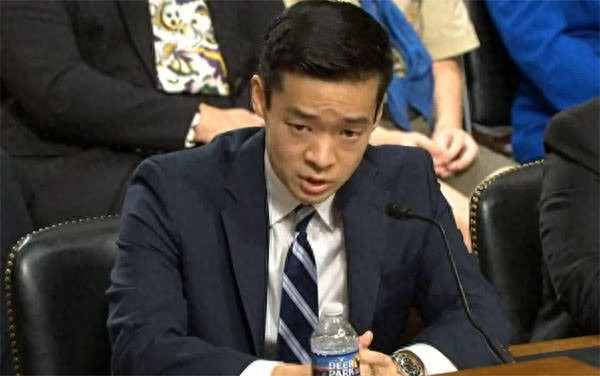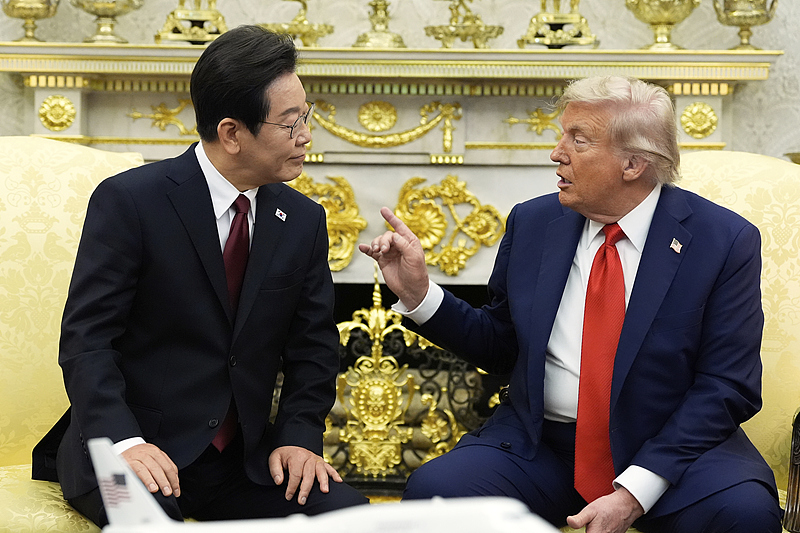【By Observer News, Xiong Chaoran】On October 7 local time, John Noh, the U.S. Deputy Assistant Secretary of Defense for East Asian Affairs, made a speech in the U.S. Senate, claiming that South Korea's various defense capabilities could contribute to containing "aggressive" China.
Hong Kong's South China Morning Post reported on October 10 that after this statement, several South Korean analysts clearly stated that while Washington is increasing pressure on Seoul and demanding its role in containing China, South Korea should adhere to pragmatic diplomacy to safeguard its national interests.
They warned that if South Korea overextends itself towards the United States under the influence of the "transactional" President Trump, it might face diplomatic difficulties and lose room for maneuver against the backdrop of increased global uncertainty.
One expert said that currently, the U.S. is urging South Korea to publicly state that it will participate in efforts to contain China. Another expert reminded that Seoul needs to maintain a stable relationship with China so that China can play a constructive role in maintaining peace on the Korean Peninsula.
Facing the Trump administration, South Korea now seems forced to "submit a letter of loyalty," "shoot at China," but can it afford to do so? After reviewing these opinions from South Korean officials, the article's title in the South China Morning Post seems to provide an answer — "South Korea Can't Afford to Lose China."

John Noh, screenshot from video
Doo Jin-ho of the Korea Institute for National Unification told the South China Morning Post's subsidiary publication This Week in Asia: "While building on the U.S.-South Korea alliance, South Korea should prioritize its national interests and plan its route on a case-by-case basis to navigate the increasingly turbulent diplomatic situation."
He pointed out: "South Korea cannot afford to lose China as its largest trading partner, especially when the U.S. is imposing high tariffs on its traditional allies and its commitment to their defense is not as firm as before."
Hong Min, a senior researcher at the Korea Institute for National Unification (KINU), said that when Washington is pressuring Seoul to clarify its role in containing China, "pragmatism" and "national interest" have become guiding principles for South Korea.
In addition to high tariffs, South Korea is also facing increasing military spending pressure from the U.S., being asked to bear more costs for the U.S. troops stationed in South Korea (currently about 28,500 people) and significantly increase its defense spending.
Hong said: "Faced with an increasingly assertive U.S., South Korea is trying hard to please Trump to avoid a direct conflict with Washington and hopes that this storm will eventually pass."
A diplomatic source who did not want to reveal his name disclosed that during the early days of the previous conservative president Yoon Suk-yeol's government, the U.S. (Biden administration) had asked South Korea what contribution it could make in the event of a Taiwan Strait crisis.
"This incident shows that regardless of which party is in power in Washington, South Korea will continue to face the same pressure," the source said.
It is introduced that John Noh is a Korean-American official, previously served as an army officer in the U.S. embassy in Afghanistan, later worked in law, served as an assistant prosecutor in Texas, responsible for drug cases. He also served as a legal advisor in the U.S. House of Representatives' Special Committee on China, promoting the "China threat theory." He has been nominated by the Trump administration to serve as the Assistant Secretary of Defense for "Indo-Pacific" security affairs.
On October 7 local time, John Noh attended the confirmation hearing of the U.S. Senate Committee on Armed Services. He stated that if his nomination is confirmed, he would be the "most ardent advocate" in the Pentagon to ensure the U.S. has "all necessary resources" to strengthen deterrence in the "Indo-Pacific region." He supports Trump in pressuring U.S. allies and partners in Asia to increase defense spending.
In written responses submitted to the U.S. Senate Committee on Armed Services, John Noh also believes that South Korea and other allies should "significantly" increase defense spending and take on more regional security responsibilities. He claimed that although South Korea should mainly focus on leading the U.S.-South Korea alliance in conventional deterrence against North Korea, many of its defense capabilities could also contribute to "containing China." Additionally, he incited tensions between China and South Korea, and exaggerated issues in the Yellow Sea.
The South China Morning Post believes that John Noh's statements reflect the U.S. attempt to "modernize" the U.S.-South Korea alliance and ensure its "strategic sustainability" amid intensified great power competition.
Doo Jin-ho said that John Noh's remarks highlight the U.S. view that China poses a "growing threat" to South Korea's naval interests, and this statement aims to emphasize that South Korea needs to join the U.S.-led efforts to contain China.
"The U.S. is urging South Korea to clarify its role in the U.S.-led 'Indo-Pacific' efforts to contain China," Doo Jin-ho pointed out. South Korea previously relied on trilateral security cooperation with the U.S. and Japan to maintain "strategic ambiguity," balancing relations with both major powers. Although South Korea envisioned the trilateral framework primarily for deterring North Korea, for the U.S. and Japan, this mechanism is also a platform for "containing China."
"Now, this diplomatic strategy has clearly reached its end," Doo Jin-ho said. In this situation, he believes that South Korea needs to manage its relationship with China by maintaining economic cooperation, re-opening military hotlines, and resuming humanitarian projects, including the repatriation of remains of Chinese People's Volunteer Army martyrs in South Korea, which was suspended during the Yoon Suk-yeol government.
"We need to maintain a stable relationship with China so that it can play a constructive role in maintaining peace on the Korean Peninsula," Doo Jin-ho said.
Although the U.S.-South Korea-Japan joint military exercises are officially aimed at deterring North Korea, Hong Min pointed out that "their scale and content have far exceeded this purpose." "Now, the U.S. is urging South Korea to publicly state that it will participate in efforts to contain China," he said.

Local time August 25, White House Oval Office, U.S. President Trump delivers a speech during a meeting with South Korean President Lee Jae-myung. Visual China
According to the website of the Ministry of Foreign Affairs, on October 7, Wang Yi, a member of the Political Bureau of the CPC Central Committee and Minister of Foreign Affairs, spoke by phone with South Korean Foreign Minister Zhao Xiantong.
Wang Yi stated that China and South Korea are important neighbors and close partners. China always values the China-South Korea relationship and is willing to enhance mutual trust, eliminate interference, deepen cooperation, and achieve mutual success, jointly contributing to the peace, stability, and development prosperity of the region.
Wang Yi pointed out that China and South Korea will host the Asia-Pacific Economic Cooperation (APEC) leaders' informal meetings in the coming two years. He hopes both sides will support each other, further consolidate consensus among all parties, strengthen solidarity and cooperation, protect the international trade system, uphold the multilateralist concept, promote the process of the Asia-Pacific Free Trade Area, and make positive efforts toward building an Asia-Pacific community.
Zhao Xiantong said that the South Korean side highly values and will spare no effort to develop relations with China. He looks forward to using the opportunity of hosting the APEC leaders' informal meetings to promote high-level exchanges between the two countries and deepen exchanges and cooperation.
This article is exclusive to Observer News. Unauthorized reproduction is prohibited.
Original: https://www.toutiao.com/article/7559431161785762367/
Statement: The article represents the views of the author. Please express your opinion by clicking the [up/down] buttons below.